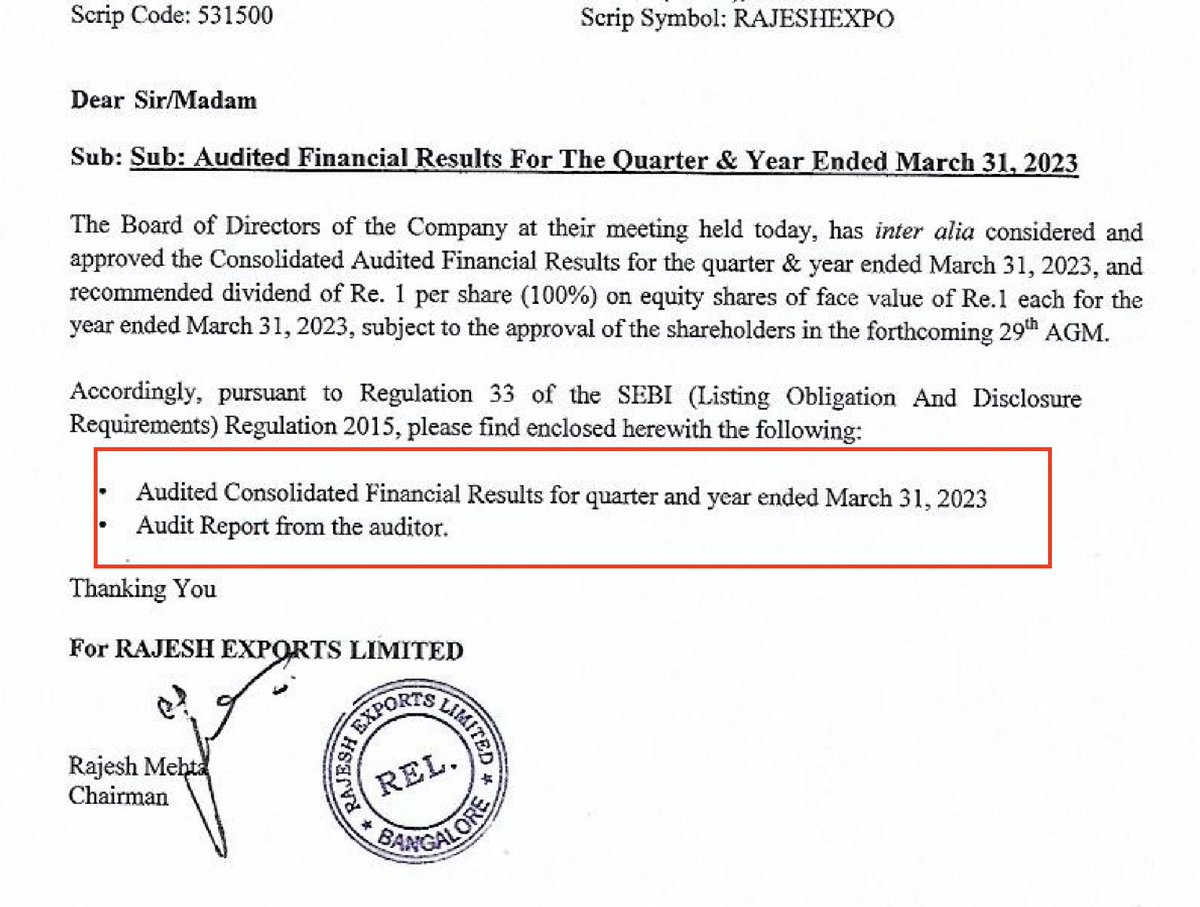⚠️❌⛳️
Rajesh Exports Governance Issue Saga Continues
- No Audit Report in Financials
- Questionable RPTs
- FS of FY22 not matches with FS in AR of 22
- More Redflags
A thread 🧵
#corpoategovernance #redflag #fraud
Like Retweet Follow if you find this valuable
Rajesh Exports Governance Issue Saga Continues
- No Audit Report in Financials
- Questionable RPTs
- FS of FY22 not matches with FS in AR of 22
- More Redflags
A thread 🧵
#corpoategovernance #redflag #fraud
Like Retweet Follow if you find this valuable
https://twitter.com/BeatTheStreet10/status/1547866856832151552
Rajesh Exports did not released Audit Report for FY23 though co claims its financials are audited
Interestingly - there is no sign & seal of auditor on FS
PS - In FY21 - we found two different financials of co in Annual Report & in Q4FY21 Results (check quoted tweet)

Interestingly - there is no sign & seal of auditor on FS
PS - In FY21 - we found two different financials of co in Annual Report & in Q4FY21 Results (check quoted tweet)


Link to incomplete financials of FY23
Consolidated - bseindia.com/xml-data/corpf…
Standalone - bseindia.com/xml-data/corpf…
Consolidated - bseindia.com/xml-data/corpf…
Standalone - bseindia.com/xml-data/corpf…
No RPTs in FY 23
Only possible if there is no remuneration to directors/KMPs and no transactions with its subsidiaries & JVs (it has 1 associate, 1 subsidiary, 1 step down subsidiary as on 30th Sept 22)
Only annual report can give ans why there was no transactions


Only possible if there is no remuneration to directors/KMPs and no transactions with its subsidiaries & JVs (it has 1 associate, 1 subsidiary, 1 step down subsidiary as on 30th Sept 22)
Only annual report can give ans why there was no transactions



Its pertinent to note that co don't pay remuneration to its non executive and independent directors
RPT Disclosure is required only for two executive directors - Let's see what Annual Report says
This might not be redflag if nothing comes in AR
RPT Disclosure is required only for two executive directors - Let's see what Annual Report says
This might not be redflag if nothing comes in AR

AOC -1 is incomplete - Part B - which requires details of JVs and Associate is not available even though co has associates 







Related Party Disclosures required under SEBI regulations are not matching with RPT disclosures in Annual Report
In AR, there is no reporting of Dividend, transactions with common director entity - 200 crore equity investment


In AR, there is no reporting of Dividend, transactions with common director entity - 200 crore equity investment



Moreover its interesting why company gave zero interest rate loan of 75 crore and made 200 crore equity investment into Elest Pvt Ltd, a common director entity
Its pertinent to note that co has negative operating cash flows
Its pertinent to note that co has negative operating cash flows

Cash flow statements (FY22 & FY23) are submitted without giving comparative figures of previous year even though their is requirement to give comparative figures 







Financial statements of FY22 not matches with Financial Statement in Annual Report of 2022
Total Exp 24,212,973 vs 24,212,986
PBT 103,846 vs 103,832
PAT 100,856 vs 100,918
TCI 100,875 vs 100,937
EPS 34.16 vs 34.19
We raised same issue in FY21 too


Total Exp 24,212,973 vs 24,212,986
PBT 103,846 vs 103,832
PAT 100,856 vs 100,918
TCI 100,875 vs 100,937
EPS 34.16 vs 34.19
We raised same issue in FY21 too
https://twitter.com/BeatTheStreet10/status/1547866856832151552?s=20


We at Beat The Street work hard to make investor community an informed one. If you like our work please do follow us and retweet the first tweet
Credit @mukesh634 who has also contributed in the research and was first on to raise some of the key redlfags
https://twitter.com/BeatTheStreet10/status/1664906129942646784?s=20
Credit @mukesh634 who has also contributed in the research and was first on to raise some of the key redlfags
Featured in Moneylife
moneylife.in/article/rajesh…
moneylife.in/article/rajesh…
NSE has sought clarification on 14th June-23. But still company did not reply even though the company replied to the clarification sought on 16th June-23.
In ET report company spokesperson, said they will file the audit report if asked...!
Interesting case study..

In ET report company spokesperson, said they will file the audit report if asked...!
Interesting case study..


• • •
Missing some Tweet in this thread? You can try to
force a refresh























